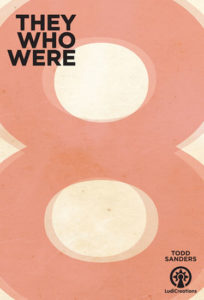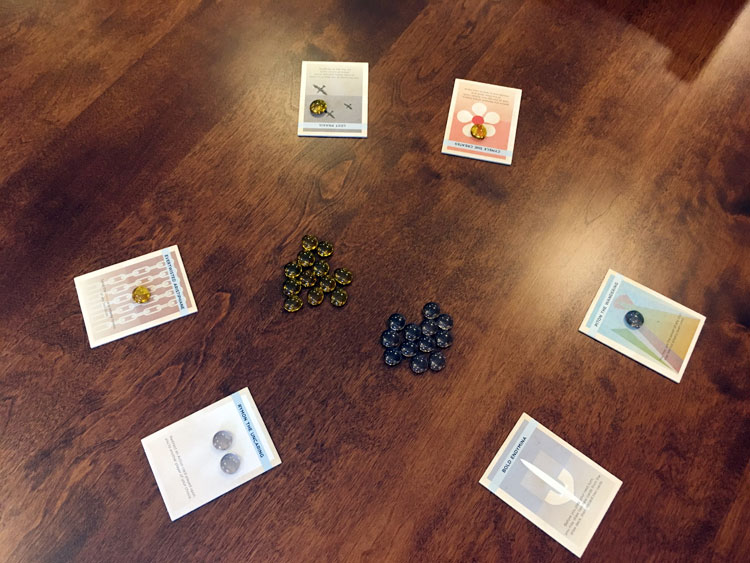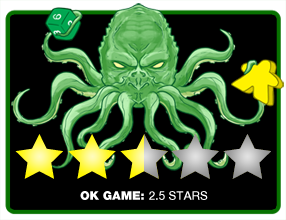 One of the earliest forms of Greek literature is a poem by Hesiod called the Theogony. It’s a story of the genealogy and origins of the ancient Greek pantheon of gods. It is these tales which form the basis of much of the drama and intrigue of the mystical traditions and origins of Western drama.
One of the earliest forms of Greek literature is a poem by Hesiod called the Theogony. It’s a story of the genealogy and origins of the ancient Greek pantheon of gods. It is these tales which form the basis of much of the drama and intrigue of the mystical traditions and origins of Western drama.
Using a similar backdrop for a theme, Passport Game Studios has brought forth a game that is quite unique. They Who Were 8 is a card drafting, area control card game for 2-4 players that takes about 30 minutes to play. It’s best with four players.
Game Overview:
A game of They Who Were 8 features multiple player partnerships with each partnership trying to become dominant through the playing of cards for victory tokens. However, the winner of the game is the player who is the weaker partner of the partnership. All of this is overlaid with a theme of ancient gods acting heroic or deceitful.
Game Components:

The components for They Who Were 8 are solid. The tarot-sized cards feel well made and hold up to repeated plays. The glass tokens that represent Glory or Infamy are standard fare, while the cardboard god tiles are adequate.
The remarkable thing about the entire package is the abstract visuals implemented for what could have been an overwrought theme. The art style is distinctive with geometric shapes and simplistic illustration. It’s a style that definitely makes the game easy to remember.
How to Play:
When sitting down to play They Who Were 8, it’s important to sit in a configuration that allows for easy reach of each player to the players sitting adjacent around the table. This is because each player has control of two gods (represented by tiles), one on their left and one on their right. Each god is partnered with the god of the next player. It is these partnerships that are the focus of the game.

To begin, players are dealt two god tiles and a hand of three cards. Each turn, players play a card and complete its effects. These are usually to manipulate the glass tokens of Glory and Infamy which are placed in the middle of the table. A card might instruct a player to give one Glory to one god while placing two Infamy on another. Players may also use the special power of their god to manipulate the game to dramatic effect. A player flips their god tile to represent this, which also shows an Infamy token on the back of the tile, thus generating Infamy as well.
At the end of the game, Glory tokens are worth 2 points and Infamy tokens are worth -1 point each. As players collect these tokens, they change the total value of each of the two god’s partnerships. For example, a player’s left hand god may have 2 points and the next clockwise player’s right hand god has -1 point to make the partnerships total of 1 point.
After each player has played one card, players pass one card to their left. The remaining cards in the deck and discarded cards are shuffled together and each player is dealt another card. Once this is complete, a new round begins.
The game ends when one player takes the last of either the Glory or Infamy tokens. Each partnership totals their score. From the winning partnership, the player who contributed the lower value wins.

Game Experience:
One immediately noticeable thing about They Who Were 8 when learning the game is that fully grokking the implications of the win conditions takes some effort. Besides understanding what effects different cards will have, players will constantly need to evaluate the game state and reference card to understand the game’s iconography.

This means they’ll need to do some short arithmetic for each partnership to compute the total and then evaluate their cards. The current scores also aren’t recorded anywhere so it slows down the game. It’s different and initially engaging, but also frustrating.
Another difficulty is that while the game purports a grand chaotic theme of gods in battle, all of that fades to the background. The game primarily feels like a competition for glass tokens of the positive kind while not generating too much of the negative kind. The game does its best to inject the theme, but the game structure itself and accounting gets in the way.
One of the other things that can crop up in games with more than two players is that certain partnerships can be ignored entirely. In more than one game this reviewer has played, certain players never felt the need to advance their partnership. This may have been due to the lack of a personal relationship between the players, or more that the urge to tear down a winning partnership may edge out the desire to advance one’s own. Another consideration might be that it’s just that much more difficult to focus on two partnerships while also trying to be the lesser value in that partnership.
Final Thoughts:
Games like They Who Were 8 can work. The play style is fresh and players will be intrigued by the concept. However, once the game’s mechanisms start to reveal themselves and the lure of the art and unique structure has worn off, an average game emerges.
For something that is supposed to be a filler game, there’s just too much calculation and game state evaluation to be friendly. While They Who Were 8 tries it’s best to keep the theme as motivation, in the end players may be happy that it does, “end” that is.
If you’d like to get a copy of They Who Were 8, you can pick it up for about $20.
Final Score: 2.5 Stars – A great concept and art doesn’t save They Who Were 8 from being a glass bead trading competition.
 Hits:
Hits:
• Engaging art
• Unique play format
Misses:
• Too much game state evaluation
• Unnecessary accounting
• Uninspiring play






















